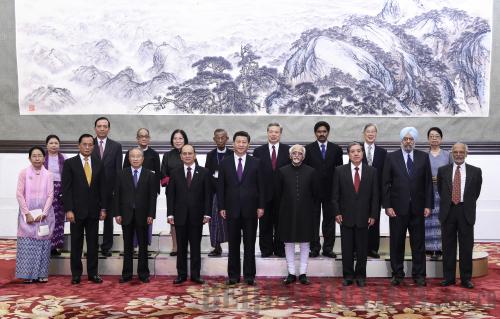|
 |
|
REUNION: Chinese President Xi Jinping, Myanmar's President U Thein Sein (fourth left, front row) and Indian Vice President Mohammad Hamid Ansari (fourth right, front row) pose with other participants at a conference marking the 60th anniversary of the Five Principles of Peaceful Coexistence in Beijing on June 28 (LI XUEREN) |
Although China is demonstrating its peaceful approach to international affairs, it has always been an easy target for critics in the Western media. Any unharmonious interaction between China and its neighbors is likely to be exaggerated by the outside world as China's wrongdoing.
Observers call it undergoing the "growing pains" of a giant. Regardless, China is trying to gain understanding with sincerity. In celebrating a six-decade-old international relations norm initiated by China, India and Myanmar—known as the Five Principles of Peaceful Coexistence —China is committing to the world that it will continue to follow its road of peaceful development. Observers add that China will contribute to the settlement of current international conflicts by making efforts in promoting and enriching the Five Principles.
An enduring norm
On June 28, China, India and Myanmar marked the 60th anniversary of the Five Principles in a high-profile fashion in Beijing with the participation of Chinese President Xi Jinping, Myanmar's President U Thein Sein and Indian Vice President Mohammad Hamid Ansari.
Initiated in 1954, the Five Principles is an important international relations tenet created by the three Asian countries, which includes mutual respect for sovereignty and territorial integrity, mutual non-aggression, non-interference in each other's internal affairs, equality and mutual benefit, and peaceful coexistence.
In the early 1950s, late Chinese leader Mao Zedong announced that China should fight for lasting world peace, that Beijing would never be aggressive toward any countries, and that it would not permit imperialism and aggression against China. He also said the Chinese people have the right to decide their country's affairs and China would not allow any other country to interfere in its internal matters. Mao added that China will also never interfere in the internal affairs of other countries. These ideas formed the rudiment of the Five Principles.
The Five Principles were first put forward by then Chinese Premier Zhou Enlai at a meeting with the Indian delegation for negotiations on bilateral relations in China's Tibet region in December 1953. The principles were later incorporated into the Agreement on Trade and Intercourse Between the Tibet Region of China and India released on April 29, 1954. In June that year, Premier Zhou visited India and Myanmar, then known as Burma. The joint statements issued between Zhou and his Indian and Burmese counterparts affirmed the Five Principles as guiding principles for China-India and China-Burma relations.
Gao Fei, a professor with the Beijing-based China Foreign Affairs University (CFAU), claimed the Five Principles have been serving as the fundamental basis of China's diplomacy. He said the Five Principles were raised in China's diplomatic practice when settling historical problems with its neighbors. Based on these principles, China has properly resolved border problems with Myanmar and Laos.
"The Five Principles have not only been the basic norm of China's foreign policy, but also reflected the demand of the developing countries and become a fundamental norm of modern international relations," said Gao.
Following the example of China, India and Myanmar, an increasing number of countries adopted the Five Principles. In April 1955, delegations of 29 countries from Asia and Africa attended the Bandung Conference in Indonesia, and 10 principles were passed—all inspired by the Five Principles.
Wang Fan, Vice President of the CFAU, noted that the Five Principles were created mainly to resolve border disputes, but its guiding significance on international relations has been expanding.
"In other words, for the current global situation, if all global members observe the Five Principles, conflicts between nations can be resolved and crises be kept under control," Wang said.
Qu Xing, President of the China Institute of International Studies (CIIS), echoed Wang, noting that the current Ukrainian crisis and Iraqi crisis were both caused by foreign interference, which goes against the Five Principles.
| 